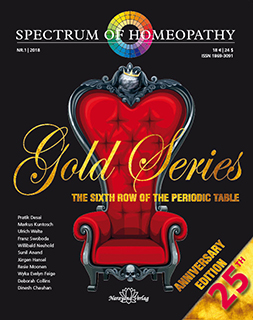

Blog archive
Follow us
Homeopathy and the world
This blog talks about interrelations of homeopathy and holistic ways of healing with the world beyond medicine, with spirituality, science and politics. The homeopathic way of thinking and questioning about problems, crises and solutions is extended to encompass more than issues of individual health. During two hundred years of work with crises and suffering we have developed a holistic way of looking at contexts and a specific way of listening, which may prove to be very helpful in collective contexts as well. In a loose series of articles I wish to show this by different current issues. This work is licensed under a Creative Commons License (Attribution-NonCommercial-NoDerivatives 4.0 International (CC BY-NC-ND 4.0)). You may distribute and reproduce it in accordance with the license terms.
(Not being a native speaker I apologize for any mistakes and appreciate any kind of amendment.) .
Jörg Wichmann, November 2017
BLOG
A severe blow to evidence-based medicine (EBM): Cochrane leaders question independence
One of the most important reference institutions for "evidence" in conventional medicine is the Cochrane-Collaboration. A study is considered credible if it has received a positive Cochrane review.
Recently, the objectivity and trustworthiness of this authority has been questioned by a competent authority: Peter C Gøtzsche; Professor, Director of the Nordic Cochrane Centre, MD, DrMedSci, MSc, in a letter dated 14.9.2018, informs that he had been dismissed from the Governing Board of the Cochrane Collaboration on the basis of a minority vote because he had allegedly damaged the organisation's reputation. As a result, 4 other leading Cochrane leadership members resigned immediately, reducing the Governing Board from 13 to 8 members within one day.
In simple terms, Peter C Gøtzsche, one of the co-founders and most renowned members of the Cochrane Collaboration, notes that the current leadership of this globally active institution has lost its independence from industrial interests and that members who indicate this problem or write reviews and reports containing unwanted criticism are bullied.
Since this process described here is just the tip of the iceberg and an incalculable number of expert opinions already issued will be affected, the reliability of these must generally be questioned. The so-called evidence-based medicine thus lacks a central argumentative pillar.
In his letter, Gøtzsche states, inter alia:
"This growing top-down authoritarian culture and an increasingly commercial business model that have been manifested within the Cochrane leadership over the past few years threaten the scientific, moral and social objectives of the organization. ... There is stronger and stronger resistance to say anything that could bother pharmaceutical industry interests. ... There has also been great resistance and stalling on the part of the central executive team to improving Cochrane´s conflict of interest policy. A year ago, I proposed that there should be no authors of Cochrane reviews to have financial conflicts of interests with companies related to the products considered in the reviews. This proposal was supported by other members of the Board, but the proposal has not progressed at all. ....
Our work informs government legislation globally, it influences medical guidelines and drug approval agencies. Therefore, the integrity of the Cochrane Collaboration is paramount. We pride ourselves on being global providers of “trusted evidence” on a foundation of values such as openness, transparency and collaboration. However, in recent years Cochrane has significantly shifted more to a business - a profit-driven approach. Even though it is a not-for-profit charity, our “brand” and “product” strategies are taking priority over getting out independent, ethical and socially responsible scientific results. Despite our clear policies to the contrary, my centre, and others, have been confronted with attempts at scientific censorship, rather than the promotion of pluralistic, open scientific debate about the merits of concrete Cochrane reviews of the benefits and harms of health care interventions. ...
As most people know, much of my work is not very favourable to the financial interests of the pharmaceutical industry. Because of this Cochrane has faced pressure, criticism and complaints. My expulsion is one of the results of these campaigns.
What is at stake is the ability of producing credible and trustworthy medical evidence that our society values and needs."(1)
-------------------------------
(1) Peter C Gøtzsche - A moral governance crisis: the growing lack of democratic collaboration and scientific pluralism in Cochrane; https://nordic.cochrane.org/sites/nordic.cochrane.org/files/public/uploads/moral_crisis_in_cochrane.pdf
The counterstatement of the remaining members of the Cochrane governing board is this: https://community.cochrane.org/news/statement-cochranes-governing-board
And here is a detailed account of observers describing the course of the conflict and the background: https://blogs.bmj.com/bmjebmspotlight/2018/09/16/cochrane-a-sinking-ship/?utm_campaign=shareaholic&utm_medium=twitter&utm_source=socialnetwork
*Peter C. Gøtzsche: Deadly Medicines and Organised Crime: How Big Pharma Has Corrupted Healthcare. 2013, Radcliffe Publ.; ISBN 978-190891-112-4
*Peter C. Gøtzsche: Deadly Psychiatry and Organised Denial. 2015, People’s Press
more than thousand
homoeopathic
books by Narayana
________________
more than thousand
homoeopathic
books by Narayana
________________
more than thousand
homoeopathic
books by Narayana
________________





